#laskarina bouboulina
Text
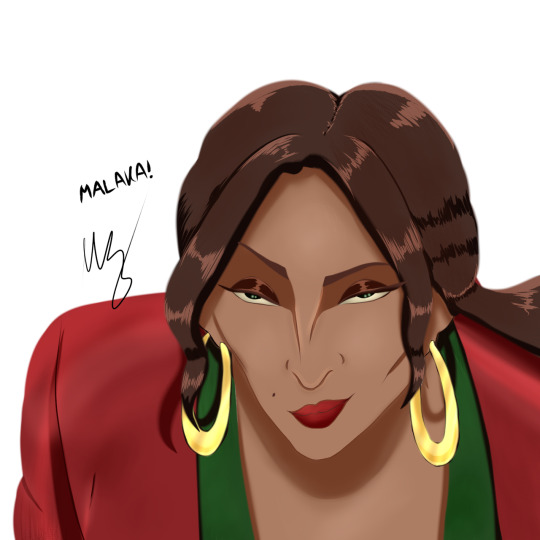
Laskarina Bouboulina from Zafara (2012).
3 notes
·
View notes
Text
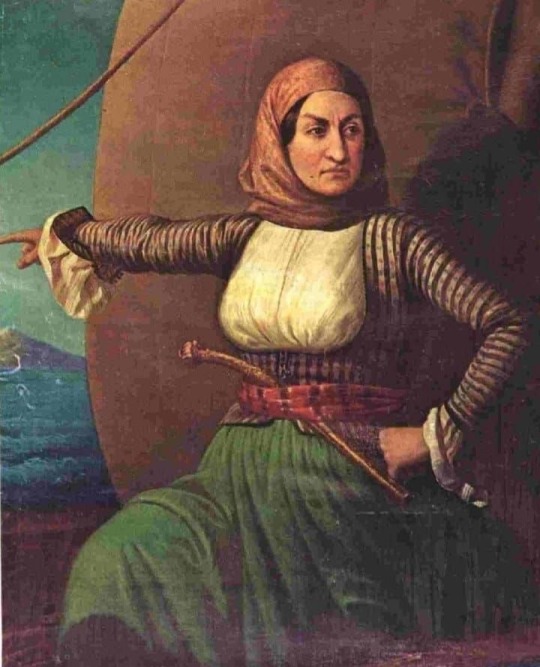
Laskarina Bouboulina — NHM, Athens
A few days after her death, a Russian delegation presented her with the honorary rank of Admiral of the Russian Navy, granted by Tsar Alexander I of Russia, making her the first woman in world naval history to hold this title.
2 notes
·
View notes
Text
And the ultimate winner of the greek sexy/iconic woman™ is
Laskarina Bouboulina
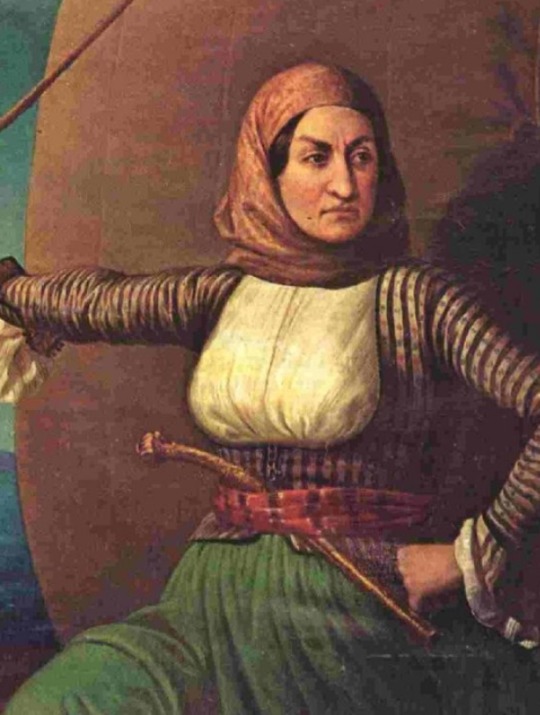
Thank you all for participating <3
#greek sexywoman poll#greek sexywomen of tumblr#greek iconicwomen#that was wild didn't expect her to win but she is an icon what can i say <3
162 notes
·
View notes
Note
What really sucks is how, while many Greek Jews have been here for literally centuries, and even for the ones that came later on, still, our traditions are so heavily linked with the standard Greek traditions (Purim which is our Apokries, has been transferred for a long time, two weeks earlier and is celebrated during the Christian Apokries instead of the standard)and it sucks that people still claim that "jews are not truly Greeks" and how we don't belong here. Sadly I have been hearing that rhetoric even more lately to the point that I don't mention that I'm Jewish to people I don't know well, in case they are weirdos. And the way that the government is going (far right with the Spartans and everything) I don't see the situation getting better soon.
What's your opinion on this theitsa;
Hello! :) First of all, thank you for entrusting me with your thoughts! It means a lot!
It irks me when I hear "they don't belong here" about people who have been citizens of this country for a very long time! (it irks me regardless, but whatever) What the fuck "belong" even means?? And who the fuck decides that?? They are here, they are citizens, they are part of the Greek history, the end! Even more so if these people speak Greek, they have Greek education, they live the Greek reality every day, they fight for the same things as the rest of the Greeks, and so on.
It sucks that this country makes you feel like you have to hide, or explain yourself in case they learn you are Jewish. This shouldn't have to happen! And, to be fair, no one is 100% "pure" Greek (I hate the concept of purity but I mention it here for argument's sake). We all have at least ONE ancestor of Slavic (/Arvanite), German, Turk, Egyptian, Hebrew, Armenian, Persian etc descent. We don't live in a bubble! Markos Botsaris (+ his crew) and Laskarina Bouboulina were Arvanites!
For this reason, I think "How Greek" one is, shouldn't define how much respect they get as Greek citizens. We are all enclosed in the same borders under a common government and we will achieve shit if we give in to infighting about who is The Best.
At the same time, I don't mean to diminish your argument about Jewish Greeks having Greek cultural elements. It makes sense that Jews in Norway and Jews in Greece won't have the exact same culture, and that they will be affected by the culture around them. I imagine it's hurtful when this part of your identity is overlooked. I'm just saying that all people here are "allowed" to be here, since our law has allowed it.
I wish I could tell you "don't be afraid! go forth and be yourself!" but realistically you will be the judge of what's safer for you. At least from my perspective, most Greeks won't have an issue. They might be very interested, even. But one or two times there will be Greeks who will create an issue for you. And these bigoted Greeks might be even more than we think.
The "funny" thing about far-right parties like the Spartans is that, while they claim to be "for Greece", they seem to parrot USAmerican rhetoric (non-Greek rhetoric) which goes against how the locals historically viewed the Jews in Greece.
Correct me if I am wrong, anon, but I feel like the rise of antisemitism in our days is very connected to the US-Americanization of Greece? This type of antisemitism (the type of conspiracies) and the intensity is the exact same I see from people in the US who worry when Jews are in positions of power.
Now, it's a historical truth that certain Greeks worked with the Nazis for power, at the time Greece was under Nazi/Axis occupation. (The Greeks still hate these families that were Germanophille at the time, because these families also worked against the interests of the rest of Greeks) So antisemitic sentiments existed before. But the land of what is now Greece was under the Ottoman Empire for centuries and the Ottoman Empire was a haven for Jews who were heavily discriminated against and killed in West Europe.
Many Jews acquired power and influence in big Greek cities like Thessaloniki, owning factories, businesses, newspapers, and real estate. They were allowed to prosper and they were an important part of our societies. (The Byzantine Museum of Thessaloniki has an exhibition this year about the Thessalonian Jewish community. It's outside and left of the cafeteria, they have a new room)
At the same time, obviously, being Jewish didn't make you automatically rich and influential. Before the second world war, there were Greeks and Turks, and French who were very rich and influential, too. Traditionally the Greeks understood this was a Class thing, not an Ethnicity thing. (And, in any case, no people deserve a freaking genocide!!!) But my point is, in the Old Times I didn't see sentiments such as "oooo the Jews are here to control us!!" whereas I feel this is a big part of the Greek antisemitic rhetoric today.
The reason I think this sentiment is brought by the US is that in the US there are many Jewish communities and many have acquired wealth or they had generational wealth. But in Greece there as soooo few Jews and they don't hold the same amount of wealth. Like, the bigoted conspiracies of the far right don't even make sense in the Greek reality 😂
For those who don't know: Despite the efforts of Greek Jews to escape the holocaust and the efforts of many Greeks to help them escape in the Επαρχία (rest of the country, outside of Athens), like in Zakynthos, an extremely large number of Jews in Greece got killed by the Axis powers in the Second World War. Hence, the large Jewish population of Greece has dwindled, and the community is really small nowadays. The community (at least in Thessaloniki) is also cautious to open their culture to other Greeks because they fear antisemitic sentiments might hurt them again. (Which is understandable to me. Btw I heard this cause a friend writing her thesis needed access to the Hebrew records in Thessaloniki)
Sorry for the long response, anon! My thoughts were many, as you can see. I would be very happy if you could tell us more things about Greek Jewish culture, if you don't mind! (how it's similar or dissimilar to the more frequent version of Greek culture) I could not find many things online, or even in museums, about it and I am genuinely curious.
Feel free to correct me on historical stuff, if you have different info! I am sure we would all be better for learning it because so much culture and historical perspective was lost from the collective average Greek consciousness with the holocaust. I hate that this gap gave rise to the rhetoric of far-right parties. I would also like to be more equipped to speak against their antisemitism by knowing more facts.
I also wonder if it's any awkward celebrating Hanukkah as a Greek Jew? 😅 I think it's not awkward (because the Greek Seleucid Empire was a looong time ago), but I am really curious if the Greek Jews think some way about it.
#greek jewish#romaniote#<- anon might not identify with this but I'd like someone to also find this post while looking for Jews in Greece#so it's just for convenience purposes#answered
14 notes
·
View notes
Note
Can you tell us some modern Greeks (1815-now) that they're underappreciated/underrated in your opinion?
If you mean internationally, many are. If you mean in the country, again many are because Greeks nowadays don't care about history or influential historical figures a lot...
Many of the heroes, the warriors of 1821. Theodoros Kolokotronis, Georgios Karaiskakis, Nikitaras, Odysseus Androutsos, Laskarina Bouboulina, Manto Mavroyenous, Konstantinos Kanaris, Rigas Velenstinlis and many more. These are the most important type of people that deserve more recognition IMO. Without them, Greece would simply have not become an independent state but also the Greek Revolution was a seminal event in modern European history and in the rise of nation-states so if you really think about it, they unintentionally led to a chain of events that wasn't just about Greece.
From politicians, Greece is so associated with incompetent and corrupt politicians that it would come as a surprise that it had a few politicians of unprecedented skill like Ioannis Kapodistrias and Eleftherios Venizelos, even Charilaos Trikoupis for his reforms and integrity of character.
From scientists, Georgios Papanikolaou (Dr Pap, inventor of the Pap smear test) and Constantine Caratheodory (Einstein's teacher).
From writers and poets, the nobelists George Seferis and Odysseus Elytis, but also Alexandros Papadiamantis, Yannis Ritsos, Nikos Kavvadias, Constantine Cavafy, Dionysius Solomos. (Nikos Kazantzakis is already well known, for Greek standards always.)
From artists, Yannis Tsarouchis, Yannis Moralis, Nikos Engonopoulos, Nikephoros Lytras, Nikolaos Gyzis, Georgios Iakovidis, Fotis Kontoglou and Alekos Fasianos.
From sculptors, Yannoulis Chalepas.
From musicians, God take this pc from me. Everyone knows that's my weak spot. Let's start from a top 5: Mikis Theodorakis, Manos Hatzidakis, Markos Vamvakaris, Vassilis Tsitsanis, Stavros Xarchakos plus an entechno bonus of Dionysis Savvopoulos and Thanassis Papakonstantinou and then it's a slippery slope from there. I know some of them are well known for Greek standards but they should be more known >:(
From actors, about half of the ones I mention in this recent post.
28 notes
·
View notes
Text
Uncover the five top things to do on the secret island getaway that celebrities don't want you to know about.
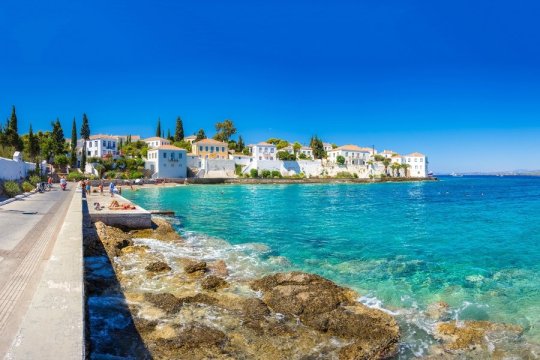
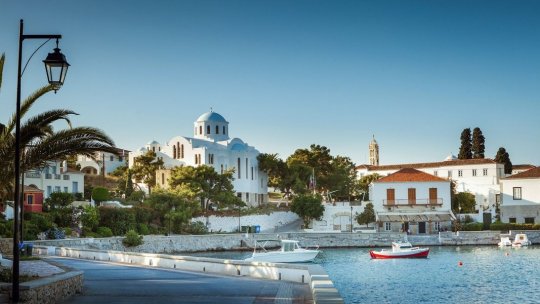

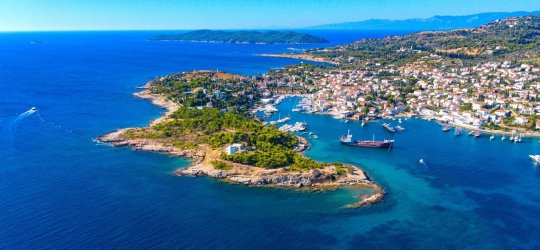
Nestled in the Saronic Gulf, Spetses is a short distance from Athens and close to other picturesque islands like Hydra and Poros. It's a haven of tranquillity where you can truly escape from the hustle and bustle of everyday life. It's
This island gem is also famous for producing the most exquisite almond sweets, so without further ado, let me give you a taste of the top 5 things to do and see in Spetses.
Explore the Old Harbour: The heart and soul of Spetses, the Old Harbour is brimming with charm and character. Wander the narrow, cobbled streets and admire the traditional architecture of the elegant mansions. Grab a coffee at one of the quaint waterfront cafes and watch the world go by.
2. Visit the Bouboulina Museum: This fascinating museum is dedicated to the heroine Laskarina Bouboulina, who played a significant role in the Greek War of Independence. Discover her incredible story and more.
3. Relax on Agia Marina Beach: A trip to Spetses would only be complete with some beach time, and Agia Marina is the perfect spot to soak up the sun. The crystal-clear water is ideal for swimming, and there are plenty of sun loungers and umbrellas for a relaxing day at the beach.
4. Take a scenic bike ride: With its relatively flat terrain and stunning coastal paths, Spetses is perfect for exploring by bike. Rent a bicycle or e-bike and enjoy a leisurely ride around the island. Stopping at hidden coves and charming villages along the way, it's a fantastic way to immerse yourself in the island's natural beauty.
5. Join a traditional Greek cooking class: What better way to immerse yourself in local culture than learning how to create mouth-watering Greek dishes? Participate in a cooking class and discover the secrets behind classic recipes like moussaka and souvlaki.
#goexploregreece#greece#travel#mustvisit#mustsee#beautiful views#spetses#saronic#thingstodo#things to do#greek island#greek islands#travel tips#travel destinations#europe#holiday#vacation#travelblogger#tuesday
6 notes
·
View notes
Text
LASKARINA BOUBOULINA // NAVAL COMMANDER
“She was a Greek naval commander, heroine of the Greek War of Independence in 1821, and considered perhaps the first woman to attain the rank of admiral. During her youth she developed an interest in sailing which was facilitated by her stepfather’s liberal attitude to education. She was widowed twice, inheriting a considerable sum of money from her second husband. She later allegedly joined the Filiki Etaireia secret society which sought to achieve Greek independence from the Ottoman Empire, being among the few women to do so. Following the outbreak of the Greek War of Independence, she commanded a fleet of Spetsiot ships which contributed to several campaigns most notably the siege of Nafplion. Following the defeat of her faction in the Greek civil war in 1824, she was briefly imprisoned and expelled to Spetses. She was killed in 1825 during the course of a family feud.”
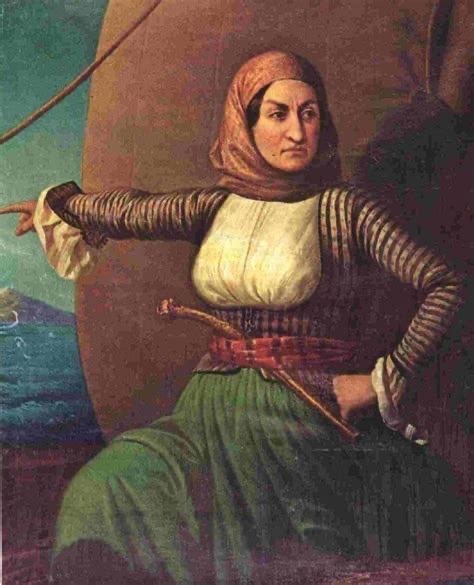
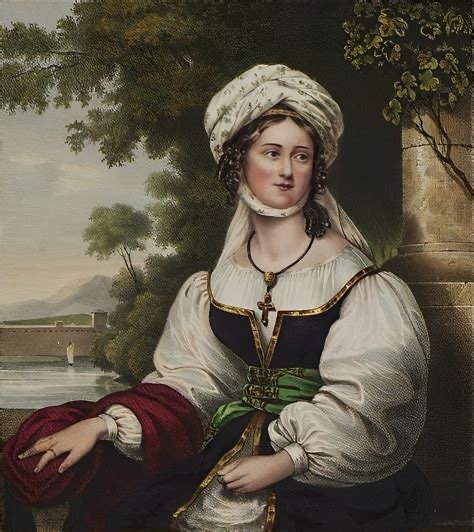
0 notes
Text
Laskarina Bouboulina
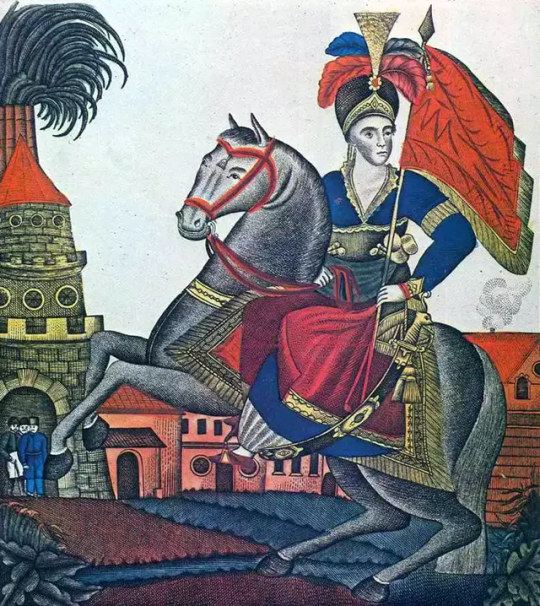
Laskarina Bouboulina · Admiralin und See-Kommandantin
Laskarina Bouboulina Pinotsis (Λασκαρίνα Μπουμπουλίνα Πινότση; 11. Mai 1771 - 22. Mai 1825) war eine griechische See-Kommandantin im Unabhängigkeitskrieg 1821 und die erste Frauenadmiralin der russischen Kaiserlichen Marine.
Bouboulina wurde in einem Gefängnis in Konstantinopel geboren. Sie stammte von der Insel Hydra. Sie war die Tochter von Stavrianos Pinotsis, einem Kapitän von der Insel Hydra, und seiner Frau Skevo.
Die Osmanen hatten Pinotsis für seine Rolle in der gescheiterten Orlof-Revolution von 1769–1770 gegen die osmanische Herrschaft inhaftiert. Bei einem Besuch ihrer Mutter wurde sie dort geboren. Ihr Vater starb kurz darauf und Mutter und Kind kehrten nach Hydra zurück. Sie zogen vier Jahre später auf die Insel Spetses, als ihre Mutter Dimitrios Lazarou-Orlof heiratete. Bouboulina hatte acht Halbgeschwister.
Sie heiratete zweimal, zuerst Dimitrios Yiannouzas und später den wohlhabenden Reeder und Kapitän Dimitrios Bouboulis, woher sie ihren bekannten Nachnamen hat. Bouboulis wurde 1811 im Kampf gegen die algerischen Piraten getötet. Die damals 40-jährige Bouboulina übernahm sodann sein Vermögen und sein Handelsgeschäft und ließ auf eigene Kosten vier weitere Schiffe bauen, darunter das große Kriegsschiff Agamemnon.
1816 versuchten die Osmanen, Bouboulinas Besitz zu konfiszieren, weil ihr zweiter Ehemann im letzten Krieg für die Russen gegen die Türken gekämpft hatte. Sie segelte nach Konstantinopel, um den russischen Botschafter Stroganov zu treffen und um seinen Schutz zu bitten.
In Anerkennung von Bouboulis Dienst an den Russen schickte Strogonov sie auf die Krim. Dort traf sie sich mit der Mutter von Mahmud II., die späteren Berichten zufolge ihren Sohn überzeugte, Bouboulinas Eigentum ihr wieder zu überlassen. Nach drei Monaten Verbannung auf der Krim kehrte Bouboulina nach Spetses zurück.
Angeblich trat Bouboulina der Untergrundorganiation Filiki Etaireia bei, die Griechenland auf die Revolution gegen die osmanische Herrschaft vorbereitete. Man behauptet, sie wäre eine der wenigen Frauen dieser Organisation gewesen. Bouboulina kaufte Waffen und Munition auf eigene Kosten und brachte diese heimlich auf ihre Schiffe, um, wie sie sagte: "meiner Nation willen" zu kämpfen.
Der Bau des Schiffes Agamemnon wurde im Jahr 1820 fertiggestellt. Sie bestach türkische Beamte, damit die Größe des Schiffes ignoriert wurde. Agamemnon war später eines der größten Kriegsschiffe in der Hand griechischer Rebellen. Sie organisierte auch ihre eigenen bewaffneten Truppen, die sich aus Männern von Spetses zusammensetzten. Dabei verbrauchte sie den größten Teil ihres Vermögens, um die Matrosen und Soldaten unter ihrem Kommando mit Essen und Munition zu versorgen.
Am 13. März 1821 hisste Bouboulina auf dem Mast von Agamemnon ihre eigene griechische Flagge, die auf der Flagge der byzantinischen Kaiser von Comnenus basiert. Das Volk von Spetses rebellierte sodann und schloss sich mit weiteren Schiffen aus anderen griechischen Inseln Bouboulina an. So segelte sie mit acht Schiffen nach Nafplion und begann eine Flottenblockade.
Später beteiligte sie sich an der Marineblockade und der Gefangennahme von Monemvasia und Pylos. Ihr Sohn Yiannis Yiannouzas starb im Mai 1821 in der Schlacht von Argos gegen die überlegennen osmanischen Truppen.
Bouboulina kam am 11. September 1821 in Tripolis an, als die Stadt fiel und traf sich mit General Theodoros Kolokotronis. Während der Niederlage der osmanischen Garnison rettete Bouboulina die meist weiblichen Mitglieder des Hauses des Sultans.
Als gegnerische griechische Parteien 1824 erneut einen Bürgerkrieg anfachten, verhaftete die neue griechische Regierung Bouboulina wegen ihrer Familienverbindung mit Kolokotronis, ihr Schwiegersohn wurde während der Ereignisse getötet. Schließlich wurde sie nach Spetses verbannt. Ihr gesamtes Vermögen für den Unabhängigkeitskrieg war mittlerweile erschöpft.
1825 wurde Laskarina Bouboulina infolge einer Familienfehde in Spetses getötet. Die Tochter einer Koutsis-Familie und Bouboulinas Sohn Georgios Yiannouzas waren entlassen worden. Auf der Suche nach seiner Tochter ging der Vater des Mädchens, Christodoulos Koutsis, mit bewaffneten Familienmitgliedern zu Bouboulinas Haus. Nach einem Streit mit Christodoulos Koutsis schoss jemand auf sie. Bouboulina wurde mitten in die Stirn getroffen und sofort getötet. Der Mörder wurde nie identifiziert.
Nach ihrem Tod gewährte Kaiser Alexander I. von Russland Bouboulina den Ehrenrang eines Admirals der russischen Marine und sie war damit bis vor kurzem die einzige Frau in der Geschichte der Weltmarine, die diesen Titel trug. Das Schiff Agamemnon wurde später an den griechischen Staat verkauft und in Spetsai umbenannt.
Auf der Insel Spetses befindet sich heute das "Bouboulina Museum" in dem 300 Jahre alten Herrenhaus von Bouboulinas zweitem Ehemann Bouboulis, in dem auch noch ihre Nachfahren leben. Eine Statue von ihr steht im Hafen von Spetses.
Zu ihren Ehren wurden auch verschiedene Straßen in ganz Griechenland und Zypern benannt, insbesondere die Bouboulina-Straße in der Nähe der Nationalen Technischen Universität von Athen (Polytechnion) und des Nationalen Archäologischen Museums von Athen, im Zentrum von Athen sowie in Piräus und in Nikosia.
Laskarina Bouboulina · Admiralin und See-Kommandantin · Person
Read the full article
0 notes
Text
"LASKARINA BOUBOULINA: HEROINE OF THE GREEK WAR OF INDEPENDENCE"/Balladeer's Blog
LASKARINA BOUBOULINA: HEROINE OF THE GREEK WAR OF INDEPENDENCE
View On WordPress
0 notes
Text
Η Λασκαρίνα Πινότση (Μπουμπουλίνα) με καταγωγή από το νησί της Ύδρας, γεννήθηκε στις 11 Μαΐου του 1771 στην Κωνσταντινούπολη, αφού ο πατέρας της, Σταυριανός, κρατείτο στη φυλακή λόγω της ενεργούς συμμετοχής του στην αποτυχημένη Πελοποννησιακή Επανάσταση, γνωστή και ως «Ορλωφικά». Μητέρα της ήταν η Σ...
https://orthodoxia.online/ethnika-themata/san-simera-gennietai-i-laskarina-bouboulina/?feed_id=31148&_unique_id=645c907b7bfc6
0 notes
Text
Research Project Tutorial
I discussed with Sally my research findings and talked about whether or not to focus on one figure in history. I explained Blackbeard interested me most in this context. Sally mentioned a female pirate named Laskarina bouboulina, as to open other points of interest in my essay (male vs female pirate representations). I said I would write about the representations of Blackbeard by timeline order (A General History of the Pyrates 1724 to Our Flag Means Death 2022). My next goal is to research Blackbeard in-depth.
Adjusted title:
How accurate are renditions of Blackbeard?
1 note
·
View note
Text

Container in the shape of a woman’s head, representing Bouboulina. The image is based on the lithograph "The Greeks" by Adam Friedel, (1830). Colored porcelain. Details highlighted in gold.
Society for Hellenism and Philhellenism Collection
#container#Laskarina Bouboulina#Society for Hellenism and Philhellenism#Adam Friedel#Greek heroine#Greek War of Indipendence#March 25th 1821#philhellenism
1 note
·
View note
Text
"Greek naval commander, heroine of the Greek War of Independence in 1821, and considered the first woman to attain the rank of admiral.
According to Dutch ambassador Taibont de Marigny she personally executed three Ottoman prisoners during her son's funeral ceremony. After failing to capture Argos, Kehaya Bey reinforced Nafplion's garrison and departed for Tripolitsa. Bouboulina then once again imposed a naval blockade of Nafplion. In May 1821, she blockaded Monemvasia with Agamemnon, while the rest of the Spetsiot fleet remained off the shore of Nafplion. The garrison of Monemvasia surrendered on 25 July, at the same time another ship under her command resupplied Galaxidi. Rumors of Bouboulina's exploits spread beyond Greece and many foreign philhellenes sought to meet her. During one such meeting in Astros, one foreign volunteer showed her a lithograph depicting her which he had purchased in Paris. The highly romanticized and inaccurate depiction caused Bouboulina to burst out laughing."
1 note
·
View note
Text
FINAL ROUND


Sappho is known for her lyric poetry and was regarded as on of the greatest lyricists of ancient Greece. She is regarded as the symbol of women loving women, with the words "sapphic" and "lesbian"deriving from her name and home island.
Laskarina Bouboulina was Greek naval commander and heroine of the Greek War of Independence (1821). Considered the first woman in Greece to gain the rank of admiral
133 notes
·
View notes
Photo
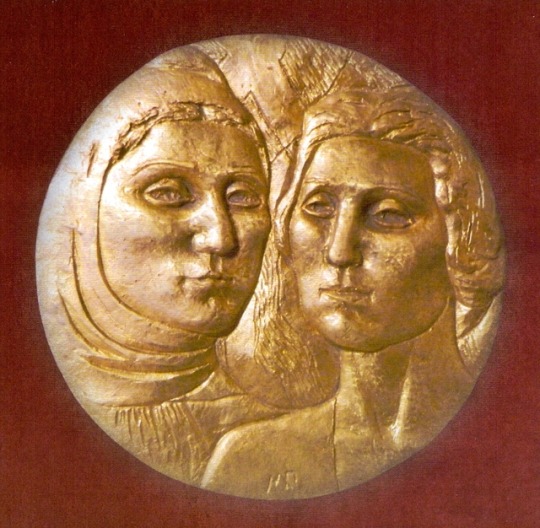
Bouboulina and Lela Karayianni
#laskarina bouboulina#Lela Karayianni#greek heroine#heroine#ww2 heroine#ελλας#ηρωίδες#μπουμπουλίνα#λέλα καραγιάννη#female warrior#female spy#feminism
2 notes
·
View notes
Photo
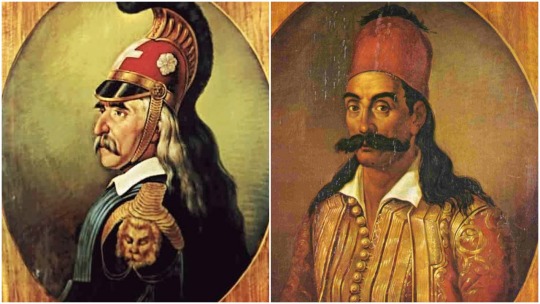


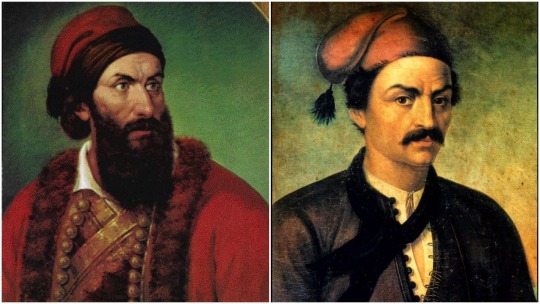



Χρόνια πολλά! Happy Greek Independence Day! March 25th 🇬🇷
Enjoy the major Greek National Day with a portrait collection of some of the most influential Greek heroes of the Independence War and their short yet layered biographies under the cut:
Theódoros Kolokotronis (1770 - 1843). Member of a powerful family clan and almost certainly the most prominent figure of the Greek Revolution against the Ottoman Empire, Kolokotronis was general and commander-in-chief of the Greek forces in the Peloponnese. Already mature when the revolution started, he was known as the “Old Man of Morea”. His victories, strategic genius, intense personality and fervor for the Greek cause made him revered among Greeks and Turks who imagined him almost like a demi-god. Kolokotronis lived to see his country liberated but he was imprisoned and sentenced to death by Otto’s regency because he had opposed it. When King Otto came of age, he pardoned him because he admired him a lot. Kolokotronis and Otto’s relations were friendly and Kolokotronis died happy in his sleep shortly after he had married his daughter to a prince of Wallachia and attended a large celebration in Otto’s palace. In 1851 his memoirs were published, as told to Georgios Tertsetis. Find out more about what Kolokotronis looked like in this post.
Geórgios Karaiskakis (1782 - 1827). Karaiskakis was originally a famed klepht (anti-Ottoman brigand) who at some point was captured by Albanian ruler Ali Pasha. Ali Pasha was impressed by his intelligence and courage and he freed him from prison to make him one of his personal bodyguards. Karaiskakis served Ali Pasha but after his death he joined the Greek revolutionaries. He started gaining fame during the last years of the war and he was appointed general of Rumeli (Sterea Hellas). His health had always been frail and he was often fighting while severely ill. He was however fatally wounded by a rifle bullet in the Battle of Phaleron. Karaiskakis has been notorious for his vulgar manner of speaking. Learn more about him and his protegee who took up arms along his side in this post.
Odysseus Androutsos (1788 - 1825). Odysseus Androutsos was famed for his stature, great strength and fighting prowess. His biggest victory was the Battle of Gravia, where he defeated the Ottoman army with only a handful of men. Androutsos was a controversial figure, especially until 1872. One year before his death and during the Greek civil war he was accused by politician Ioannis Kolettis that he had made a secret agreement and joined the Turkish forces against the Greeks. Androutsos indeed had made an agreement because due to the civil war he and his men had been left without arms and provisions and ceded to lead the Turks in a battle himself. Androutsos abandoned the Turks in the middle of the operation and surrendered voluntarily to his own Greek henchman, Ioannis Gouras, claiming he meant to trap the Turks but failed. Androutsos was imprisoned, tortured, beaten to death in his cell and then thrown from the top of the Acropolis while denied a trial first. However, politician and later PM Ioannis Kolettis, founder of the pro-French political party, was later revealed to be one of the most problematic politicians of the era, involved repeatedly in clientism, electoral frauds, bribery, corruption and enormous fortune obtained through politics. He also had terrible relations with other Greek fighters, reportedly attempting to destroy the reputation and happiness of Kolokotronis and Mavroyenous respectively. Initially, it was told Androutsos had escaped from prison and fell from the Acropolis in his hurry to flee. Much later, a witness revealed the warrior was killed in his cell beaten by many men simultaneously, as he could not be taken in an one-on-one fight. It was also revealed Kolettis had unsuccessfully attempted to bribe another Greek fighter to murder Androutsos, even before the seeming betrayal. Therefore, Androutsos’ reputation was restored in 1872 and a proper funeral took place for him 40 years after his death. Interestingly, the English Wikipedia seems to side against Androutsos while the page for Kolettis is short and adresses the crimes Kolettis has been accused of very carefully. Make of this what you will. I wasn’t sure if I should add Androutsos, however one of the most integral figures of the Independence War, Ioannis Makriyannis, accused Kolettis of defaming and murdering Androutsos and Kolettis is proven to have been a deeply corrupted man so...
Laskarina Bouboulina (1771 - 1825). Bouboulina was a naval commander and the first woman to attain the rank of admiral. She loved sailing from a young age. She was widowed twice and as she inherited a lot of wealth from her second husband, she commanded a big fleet. She was known as “the Captainness” and “the Lady”. She often joined assemblies of war chiefs to discuss all affairs militaire, where she was treated as an equal and her opinion was valued. During the Greek Civil War she was mistreated too, expelled to her island Spetses and briefly imprisoned on false charges. She was unfairly killed in 1825 over an irrelevant family feud. Her son and a girl had eloped, as the latter was forced to marry a man she did not want. Her father and brothers went to Bouboulina’s house believing the couple was hiding there. Bouboulina supported the couple’s choice and showed up in her balcony to confront the girl’s family. She was shot by the armed men.
Alexander Ypsilantis (1792 - 1828). Ypsilantis was member of a very old and noble Greek family from Constantinople. He was a Prince of the Danubian Principalities and the senior officer of the Imperial Russian cavalry. He lost one of his arms in the Battle of Dresden against Napoleon at the age of 21. He was appointed as the Leader of the secret Friendly Society, the association coordinating the Greek Revolution, a position he accepted with great enthusiasm. Ypsilantis attempted to raise all the Balkan people against the Ottomans and to even involve the Tsar of Russia and Austria but he failed and his army was defeated by the Turks. He was kept confined in Austria for 7 years. After his release, he retired to Vienna where he died in extreme poverty and misery. His last wish that his heart be removed from his body and sent to Greece was fulfilled. Ypsilantis’ own operation might have failed, however he offered a great distraction to the Turks as the revolt in the Peloponnese (the one that led to the successful revolution) broke out at the same time the Turks were busy fighting him. His brother Demetrios was luckier - he led many victorious battles inside Greece, including the very last one before the official establishment of the Independence.
Nikitas Stamatellópoulos (1782 - 1849). Known as Nikitarás (big/great/fearsome Nikitas), he was notorious for his fighting prowess and for the “body count” attributed to him. There are many tales of his skills and ferocity. He once defeated a Turkish army of several thousands with a few hundreds of men. Another time it was reported he broke three swords during the same battle. He would also often keep fighting wounded. Despite his violent character in battle, outside the battlefield Nikitaras was known to be a man of integrity and decency. He was the fighter who furiously refused the bribery to kill Androutsos. He also always refused to take booty from the defeated, explaining his only motivation was the liberation of his nation. After the war, he was imprisoned alongside his uncle Theodoros Kolokotronis for the same reason, opposing Otto’s regency. Upon his release, he had serious undiagnosed diabetes which turned him blind. He was also in a state of destitution. The Greek state ignored him, giving him only a permission to be a beggar on Friday mornings! After some time, civilians complained to the state for the neglect of the great hero and the state gave him a honorary title and a tiny pension. Nikitaras’ last wish to be buried next to his uncle Kolokotronis was granted.
Grigórios Díkeos or Papaflessas (1788 - 1825). Papaflessas was a priest, ordained to the rank of archimandrite, a politician and a warrior. He was defiant by nature and had personal hatred for the Turks, because they had killed his family. Papaflessas travelled to Mount Athos and Constantinople to study Ancient Greek and Theology, aiming to become an archbishop. There he met many patriots and he was recruited by the Friendly Society. After that he took his role very seriously and he travelled throughout Greece to raise Greeks against the Ottomans and convince them it was the right time. He is considered the most influential in spreading the desire for a revolution. During the war he fought in many battles and offered to confront Ibrahim’s newcoming Egyptian army with his 3000 men. The two thirds abandoned Papaflessas when they saw the size of Ibrahim’s army (17,000 men), however Papaflessas and his remaining 800-1000 men stayed and fell. It is said Ibrahim ordered his body to be cleaned and he kissed him on the cheek, stating that if Greece had another ten men like him, he would never be able to take Peloponnese. Papaflessas loved women and gold too much to be good for a cleric but his unwavering love and passion for freedom is indisputable.
Konstantinos Kanaris (1790 - 1877). Kanaris was an admiral and three times PM of Greece. He was very successful in naval combats and he repeatedly caused utter destruction to Turkish fleets and flagships. He had the idea to burn the Egyptian fleet in Alexandria before it set sail for Peloponnese and he would have succeeded, had the winds not changed direction as he was approaching. Kanaris would always prepare himself before a battle, saying: “Konstantí, you are going to die!”. However, he did not. He survived to become a prominent and popular politician and died at the age of 87, while still serving as Prime Minister!
Count Ioannis Kapodistrias (1776 - 1831). Coming from a very old deeply wealthy family and without a doubt one of the most brilliant Greek politicians and diplomats, Kapodistrias was a lawyer, a doctor, a diplomat affiliated to the Russians, later Minister of Foreign Affairs of Russia and honorary citizen of Switzerland as he was the one who added two more cantons to the Swiss dominion with his diplomatic maneuvers. After the Independence he was appointed Governor of Greece. Kapodistrias tried to create a functioning state out of thin air. Britain and France loathed him and turned rich clans against him because he was so friendly with Russia. Therefore they also refused to give him loans. Kapodistrias essentially had zero funds and therefore he started building foundations, hospitals, schools, museums and sometimes entire towns out of his own fortune. Moreover, he refused to take a salary because he thought it was his duty to serve the Greek people. He also took money from the rich and gave it to the poor and tried to put an end to the feudal system the Greeks were used to during the Ottoman occupation. A Sunday morning on his way to the church, he was assassinated by family members of a well known fighter coming from a rich clan which had revolted against him. Kapodistrias was buried with the clothes he wore during his assassination, as he had no other clothes left. In fact, he had given his very last possessions to orphans and widows. For more details about this great man, check this post.
Rigas Velestinlís or Fereos (1757 - 1798). Fereos was a teacher, writer, political thinker and revolutionary. He was a pioneer of the Greek War of Independence. He envisioned an uprising of all Christian populations against the Ottoman Empire and he came to touch with Napoleon Bonaparte and the general of the Army of Italy, hoping for aid. As the man agreed to meet Fereos, the latter set out to travel to Venice. He was betrayed to the Austrian authorities (then an ally of the Ottomans) by another Greek. Austrian authorities handed him over to the Ottomans, who imprisoned him, tortured him and eventually strangled and threw him to Danube river.
Mantó Mavroyenous (1796 - 1848). The educated daughter of a very wealthy Greek merchant in Trieste, Italy, with descent from Mykonos island, she gave her entire fortune for the Greek cause. She also encouraged many of her influential friends to offer money and weapons to the Greek revolutionaries. She was beautiful, had studied Ancient Greek philosophy and History and also was fluent in Italian, French and Turkish besides Greek. Once the struggle began, she moved to Mykonos island where she persuaded the locals to join the war. She led them successfully in a battle against the Turks and then also equipped men and sent them to aid in Samos island and the Peloponnese. She led expenditions in western Europe, especially addressing the women of Paris, to side with the Greek cause. She moved to Nafplion, where she met Demetrios Ypsilantis and they were soon engaged. A great part of the political world didn’t want two so powerful and pro-Russian families to unite. The aforementioned politician Ioannis Kolettis took it upon himself to destroy their relationship. Mavroyenous eventually returned to Mykonos, heartbroken and destitute. When the war ended Governor Ioannis Kapodistrias awarded her the rank of the Lieutenant General and granted her a dwelling in Nafplion, where she moved.
Athanásios Diakos (1788 - 1821). Diakos’ real surname was Grammatikós. Diakos refers to him being a Greek Orthodox deacon from an early age. Diakos was particularly good looking. It is said that the reason he abandoned the church and became a brigand was that he reacted too violently one time that he attracted the unwanted attention of a Turk. He was forced to flee his monastery and joined irregular troops in the mountains. He quickly distinguished himself in fights against the Ottomans, eventually becoming a commander. In the first year of the war, he liberated a large part of Sterea Hellas. However, in his last stand near Thermopylae (which parallels him to Ancient Spartan King Leonidas), he was captured by the Turks and suffered a most gruesome death by impalement. Two famous quotes are attributed to him. Before they killed him, the Turks offered him an officer’s position in the Turkish army as long as he converted to Islam. Diakos responded: “I was born a Greek, I shall die a Greek”. Then, according to tradition, as he was led to his horrible death, it is said he sang: “ Behold the time Charon (ancient deity who led the dead to the underworld) chose to take me, now that the branches are flowering, and the earth sends forth grass”. It is believed this had a double meaning, as he was killed in April 24th but it was also the very first year - the Spring - of the Revolution.
Ioannis Makriyannis (1797 - 1864). Makriyannis was a merchant, political officer and general of the Greek Independence War. He led the Greek armies to many victories, the most important being the defence of Nafplion, then capital of the Greek state, from Ibrahim pasha. It was the first success against Ibrahim and his enormous Egyptian fleet. Makriyannis is also known for later coordinating a revolt against King Otto, which forced the King to grant the first Constitution of Greece. Makriyannis had very active political presence and his actions were generally motivated by reason and integrity. However, he is mostly known for writing his memoirs, which remain to this day the most reliable and informative source about the Greek revolution. He also worked with an artist to create 24 drawings depicting loyally historical events as experienced by Makriyannis himself. Makriyannis’ memoirs are not only a source of information but the first great literary work in Demotic Greek. Nobel awarded Giorgos Seferis stated Makriyannis was one of the greatest masters of Modern Greek prose.
Andreas Miaoulis (1765 - 1835). Miaoulis was originally a corn trader who gained a lot of wealth. When the war broke out, he used this money to aid the fighters and command his own fleet. He was trying to help in any way possible. He was appointed admiral and had many victories in naval combats throughout all of Greece. He was the one who was secretly supplying the sieged city of Missholonghi with stores and reinforcements through its lake, a very delicate task. Soon he retired but he returned to his position as admiral once Kapodistrias became governor, fighting the piracy in the Aegean sea effectively. However, his relationship with Kapodistrias grew hostile because Kapodistrias did not favor the (rich) clans of former warriors and was loathed by the British, whom Miaoulis favored instead of the Russians. So much that Miaoulis eventually participated in a revolt against him, ending up burning Greek ships, although it is not known whether it was by his own choice or he was told to. He has been heavily criticized both then and now for this deed. Kapodistrias was ready to pardon him and his men but his assassination came first. Miaoulis’ reputation was officially restored upon King Otto’s arrival in Greece. It is known he expressed some regret over his action, confessing to politician Spyridon Trikoupis that if he had a wise man like him by his side to advice him, he wouldn’t have done it. Furthermore, he was appointed again as an admiral but this time Miaoulis refused, which historians believe it was due to feelings of guilt. When he died, he was buried in the coast of Piraeus where it is believed the Ancient Athenian general and admiral Themistocles was buried too. His heart is kept in a silver urn in the Museum of Hydra.
#greece#history#greek revolution#greek war of independence#greek history#modern greece#modern greek history#theodoros kolokotronis#rigas fereos#georgios karaiskakis#odysseus androutsos#laskarina bouboulina#nikitaras#alexander ypsilantis#papaflessas#konstantinos kanaris#ioannis kapodistrias#manto mavroyenous#athanasios diakos#ioannis makriyannis#andreas miaoulis
104 notes
·
View notes